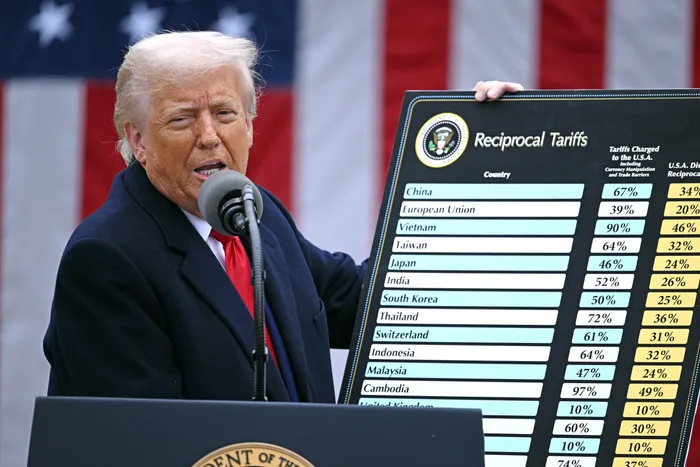Africa Needs Genuine Friends and Solidarity, Not Big Brother Mentality
FOREIGN AFFAIRS

Trump 2.0 has gone measures up, selectively and divisively putting African countries under the Orwellian gaze in ways that project, “Big Brother mentality."
Image: Brendan Smialowski/AFP
The most challenging emotion for any African international relations observer and ordinary person today is processing the current US administration’s stance against South Africa, in particular, and Africa in general. The legacy of the US in Africa may be problematic and mostly detrimental to the African population. But Trump 1.0 and 2.0 have demonstrated shocking derisive contempt for the continent and its people.
Depending on which side of the debate one is on, the US could be the world's number one superpower or a rapidly declining one. The rise of a multipolar world and global pluralism, which recognises the emergence of other civilisations and nations, and their right to chart their foreign policies as long as they align and recognise the United Nations Charter, must be recognised.

Gideon Chitanga, PhD, is an international relations and political analyst.
Image: Supplied
Although the African continent bled its most important asset, its human resources, through the slave trade, and was later subjected to close to a century of colonialism, its contribution to human civilisation through intellectual production and culture, abundant natural resources and trade, and the struggle for independence, self determination and national sovereignty should never be taken for granted.
There is no doubt about the realisation and direction the continent needs to take, despite many national challenges. Africa is part of a fast-changing world order in which genuine friendships, partnerships and solidarity informed by empathetic historical understanding of its contradictions and choices could steer a robust path towards development.
The rise of China, the second-largest economy in the world, and a nucleus around which the multipolar world is emerging into a reality, attests to changing times attuned to genuine multilateralism. Africa-China cooperation, and growing ties among countries of the global south are producing irrefutable evidence of progressive socio-economic transformation in infrastructure, energy, agriculture, and industrial partnerships, which are unfortunately rattling other powers, instead of supporting such initiatives.
Increasingly, Africa and other countries in the global south are demanding an equal voice, responsible exercise of power and an equal share of economic prosperity in the interest of Africans and the whole human race. Despite resonant calls for commitment to multilateralism, a more participatory and equitable world order based on solidarity, international cooperation and mutually beneficial relations, respect for the national sovereignty and self-determination of other nations, the Trump Administration is rewriting history to the age of power is mighty, characterised by “big brother mentality.”
Trump 2.0 has gone measures up, selectively and divisively putting African countries under the Orwellian gaze in ways that project, “Big Brother mentality." There is no denying the power of partnerships, including bilateral relations with the US, but Africa needs genuine friendship and solidarity that is informed by, and shares common concerns with, the structural legacy of poverty and inequality induced by close to a century of colonial hegemony.
To the extent that some of the African leaders have failed their nations, and indeed Africa, friends of the continent and its people should work positively with Africans, who have a better, deeper understanding of their conditions to improve national institutions, governance, and equip the young generation of leaders with proper skills to lead during increasingly complex fluid global context. Furthermore, they must closely collaborate with African countries, and together with much of the global south, to advocate for more equitable international relations, fostering mutually beneficial win-win relations among all nations.
While African countries and much of the global south are focused on improving socio-economic transformation at home, and multilateral relations that uplift many of us, Washington has chosen to go isolationist, seeking to “Make America Great Again” (MAGA).
Since the Trump Administration assumed power, it has imposed economic tariffs, including on some of the weakest economies in Africa, unilaterally cut aid, walked away from multilateral commitments such as the Paris Agreement on climate change, and recently from the United Nations Educational, Scientific and Cultural Organization (UNESCO). UNESCO is a specialised agency of the United Nations whose core mission is to build peace and security through international collaboration in education, science, culture, and communication.
A statement attributed to Audrey Azoulay, the Director-General of UNESCO, says that the US withdrawal was anticipated, of course reflecting the general recognition that Washington is rolling back or out of major multilateral institutions. Azoulay profoundly noted that the decision to withdraw from UNESCO contradicts the fundamental principles of multilateralism.
While withdrawing from multilateral institutions may be a legitimate choice of the current US Administration and American voters, it is its external behaviour that is not only concerning, but also boggles the mind. Let's take the example of South Africa, a major continental economic and political hub, which now finds itself as a major target of the US republican government.
South Africa is a relatively stable multiracial democracy facing severe economic challenges, which, among many factors, largely accounts for its sluggish economic growth at an average of 1% in the past decade. A combination of growing violent crime, partly attributable to growing unemployment and a huge influx of economic and political migrants, has created major challenges for South Africa’s Government of National Unity, under the African National Congress (ANC) and the Democratic Alliance (DA), a party dominated by the minority white population.
US-South Africa relations are in jeopardy, but not because Pretoria has violated any of its domestic or international obligations. South Africa has consistently sought to exercise its foreign policy under its constitution and historical norms, in some cases to the consternation of US foreign policy, which tends to be oblivious of the human rights of its targets and the interests of the Global South.
South Africa assumed its continental and global prominence after probably experiencing the harshest apartheid policy suffered by any nation. Secondly, like many post-colonial African states, the exercise of its national sovereignty and self-determination was realised out of a painful liberation struggle by its oppressed population.
Yet, recently, the U.S. House Foreign Affairs Committee voted 34-16 to send the ‘’U.S.-South Africa Bilateral Relations Review Act’’ to the full House of Representatives. The bill seeks a review of U.S.-South Africa relations over objections to the latter’s foreign policy, and imposition of sanctions on South African government and business officials.
The US is also snubbing the G20 under South Africa’s Presidency, threatening the imposition of high tariffs, expelling Pretoria from AGOA, which, for all purposes, seems to have been overtaken by tariffs. The Trump Administration has also threatened to impose 100% tariffs on members of the BRICS, and to punish South Africa for its close relations with China, as well as its human rights advocacy on the Israeli war on Gaza.
Sanctions will complicate South Africa’s future economic prospects. Perhaps this US administration has ushered in a critical juncture for African countries to stand together in unity. The global south must reinforce national and international solidarity, intensify calls for robust multilateralism based on the United Nations Charter.
China has strongly stated that Beijing will stand with the people of South Africa. While leveraging abundant natural resources for national and continental development, African countries must consolidate their relations with China, under the Belt and Road Initiative (BRI), the Forum on Africa China Cooperation (FOCAC), and multilateral and bilateral platforms, to advance national, regional, and continental interests. South Africa must seize this moment to champion reinvigorated calls for continental unity within Africa and with genuine friends in the Global South.
Gideon Chitanga, PhD, is an international relations and political analyst.